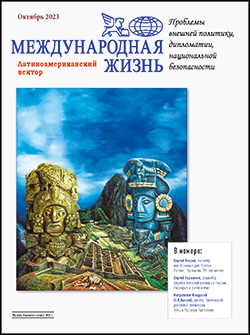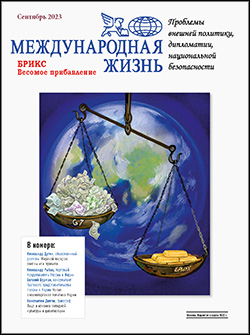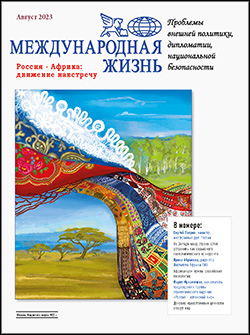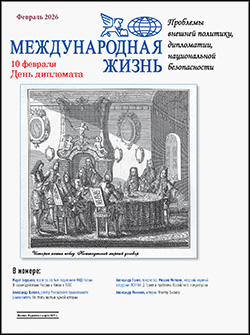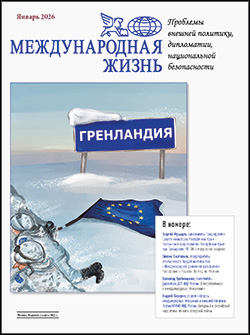GEOPOLITICS
E. Kozhokin
European Union, Russia, and the CIS: the Demographic Dimension
Relying on soft power, the EU pursues a dual purpose vis-a-vis its neighbors including the CIS countries. On the one hand, the EU tends to offer a clearly progressive model of political organization, on the other – it leaves to the countries around it the role of Europe's resource base with no competitive potential in science and technology. For Russia, the EU is a rival and a partner in one. The objective of the present study is to take a deeper look at the EU struggle over promising human resources and to outline the terms under which Moscow can cast its labor market relations with Brussels into a partnership atop of the competition.
Keywords: the EU, Russia, the CIS, the demographic dimension
P. Iskenderov
Historical, Military-Political, and Legal Aspects of the Kosovo Problem
The escalation in the predominantly Serb-populated northern part of Kosovo, combined with Europe's deepening crisis, highlighted several previously unappreciated aspects of the Kosovo problem. It became ultimately clear that Europe's attempts to achieve a resolution based on “technical” talk between Belgrade and Pristina – the course adopted by Brussels in late 2010 – are counterproductive and essentially drive radicalism on both sides, thus putting in jeopardy the fragile peace in the Balkan region.
Keywords: Kosovo, Serbia, Russia, the Balkans, international relations, geopolitics, Eurasian space, the Greater Albania, the International Criminal Tribunal for the former Yugoslavia
A. Lyukmanov
Ottoman Modernization
In the XX century, Turkey made full use of the favorable international disposition to bridge the development gap, to give a boost to its economy, and to build solid foundations for sustainable progress. The country posted an impressive GDP growth in the 1990ies after enduring a round of shock therapy and hyperinflation. The Turkish GDP swelled roughly by factor of three – from $90b to $269b – over the 1988-1998 decade, with the annual per capita income climbing close to the $4,000 mark by the end of the past century.
Keywords: S. Demirel's government, “gray” trade, Laleli – the downtown Istanbul, the “green” capital, Islamists, MÜSİAD, TÜSİAD, TUSKON
D. Protopapas
Turkish Geopolitical Interests and the Middle Eastern Rebellions
The Arab Spring left the balance of forces in the Middle East and in North Africa tilted, with some of the regional players gaining and others – confronted with new problems. The uprisings in the Arab countries translated into a serious challenge to Turkey's foreign-policy agenda of zero problems with neighbors. The current priority for Ankara is to establish itself as the moderate power in the transformed Arab world.
Keywords: the zero problems policy, Gaddafi, the Al-Assad regime, the Muslim Brotherhood, Mubarak.
EDITOR'S COLUMN
A. Oganesyan
The West and the East: Separated by a Veil of Mystery
It is expedient to draw the red line, overstepping which would imminently trigger a full-blown conflict of civilizations. We find ourselves coexisting with a dormant volcano as long as the Sharia law reads like a collection of overstated regulations with limited applicability in the modern world's settings and remains confined to the Muslin community. The moment the Sharia law claims a universal status and the Sharia courts attempt to draw non-Muslims into their virtual jurisdiction – a policy symmetric with regard to how, these days, the West projects its ideological postulates onto the Muslim world – please be aware that the eruption begins and the lava is flowing.
Keywords: John Rawls, a veil of mystery, the Muslim world
ARAB WORLD
A. Podtserob
The XXI Century Arab Uprisings: What Comes Next?
Outbreaks of mass protests across the Middle East and North Africa induce a sweeping transformation of the regions' political landscape. In a departure from the typical pattern, the protests flared up not only in the countries with staggering economies and severe social problems, but also in those which used to boast completely tolerable socioeconomic climates. The array of the main causes behind the unrest appears to be common to the majority of the Arab countries, with the rise of the respective civil societies central to the process.
Keywords: the Middle East, North Africa, Libya, Syria, Egypt, Yemen, the UN, mass protests, democratization
A. Bazhrektarevich
The Geopolitics of Energy and the Arab Spring
Watchers and players of the game unfolding on the chessboard of energy geopolitics have a lot to learn from the Arab Spring. With some of the critical information missing as things happen fast and the situation remains fluid, the present essay has to balance between factual description and more daring analysis, and the resulting conclusions should be viewed as hypothetic. Thee Gulf countries are considered as the first step.
Keywords: energy geopolitics, Gulf countries, Arab Spring, the Middle East
ECONOMY
E. Khalevinskaya
The Regulation of the International Commodities Trade
The volatility of the oil, sugar, and cocoa markets, along with the 2011-2012 upward pricing trends in the word's agricultural sector, increasingly worries the business, political, and analytic communities. Papers on the oil business, food security, and the games around financial derivatives multiply, but surprisingly little coverage is being given to the theme of the international commodities regulation which entered into force in the 1970ies and could be credited with reasonable efficiency before coming under the pressure of globalization at the end of the XX century.
Keywords: international commodities trade, WTO, International agreements on commodities
A. Shakirov
US Anti-Corruption Measures for the International Markets of Commodities, Services, and Finances.
Traditionally, studies of international trade control focus on export regulation including export quotas, subsidies, or limitations due to security concerns. It should be noted, though, that the policies of the world's strongest economies increasingly emphasize such aspects of the international business activity as the elimination of trade and financial barriers or the creation of favorable conditions across the global market for national exporters and investors.
Keywords: US foreign economic policy, anti-corruption measures for global markets, international-scale bribery, Russia – US relations
THE WORLD AROUND
O. Egorova, A. Moiseev
The Trace of the “Russian Spaniard” in History
Upon scrutiny, it transpired that the puzzling part of the picture in the upper-left corner of the Casa de Montalvo portrait of a nobleman was a drawing of a steam engine – the “fire bomb”, in the terms of the epoch – which was used in Cuba for the first time ever to produce sugar. Our further studies based on archive materials and available testimonies showed convincingly that the design is attributable to world-famous Spanish engineer and a prominent figure of the XVIII century industrial revolution Agustín de Betancourt.
Keywords: Agustín de Betancourt, the Petersburg State Transport University, the Gosznak company, the Moscow Manege, the Betancourt star
T. Owen
To Understand How the Solar System Came into Being, We Have to Understand Jupiter
A flight to Jupiter in an attempt to gain knowledge about the planet should present us with an opportunity to discover the miracles of the Solar System. That is right even though the Juno is an unmanned satellite. In fact, the Earth is indebted to Jupiter, a friendly giant which has shielded our planet a number of times from comets, etc., absorbing some of them and repelling others.
Keywords: Solar System, mission to Jupiter, Juno, NASA
BOOKSHELF
A. Oganesyan.
S. Lavrov. Between the Past and the Future
Paradoxically, the world shaped by untamed subjectivity must also depend increasingly on the balancing input from ahead-of-the-curve persons who generate unanticipated ideas and bold solutions. Credit must be given to S. Lavrov for offering a wealth of such ideas and solutions in his Between the Past and the Future, a collection of essays which, bearing a distinct imprint of Lavrov's unique personality, blends fluid policy analysis and much more fundamental philosophical regards.
Keywords: S. Lavrov's “Between the Past and the Future”, A. Gorchakov, P. Stolypin, Z. Brzeziński, F. Fukuyama
V. Vorob'ev
Israeli Settlements on Arab Territories
The Palestinian-Israeli conflict has been a burning issue of world politics for over six decades. Its importance is due to a host of reasons, and literature on the subject is plentiful, but quite a few of the dimensions of the no-longer regional conflict still await thorough investigations. That is true, for example, of A.V. Krylov's “Israeli Settlements on Arab Territories (1967-2007)”.
Keywords: the Palestinian-Israeli conflict, the West Bank, the Golan Heights, the Gaza Strip, Jerusalem
F. Mukhametshin
Opening up Russia to the World and the World – to Russia
“Modern Civil Diplomacy: the Russian Dimension”, based on the December, 2012 international forum titled “The role of Civil Diplomacy in Advancing the International Humanitarian Cooperation” was published recently. The book brings together the theoretical and practical aspects or Russia's contemporary civil diplomacy.
Keywords: “Modern Civil Diplomacy: the Russian Dimension”, soft power, civil diplomacy, the building of civil society
S. Filatov
Digest of Current European Discourse
No doubt, the PR journal is solidly on track. What impresses the reader about it most is the aesthetic quality of the collection of essays, and your first guess about the contents based on the title may be wrong – PR is not about public relations but stands for The Prime Russia Magazine.
Keywords: The Prime Russia Magazine, a journal for urban intellectuals
IN RUSSIA'S FOREIGN MINISTRY
E. Pyadysheva
The World's Only. A Decade of the Center for the History of Russian Diplomacy
The Center for the History of Russian Diplomacy, commonly refereed to as “the Museum” in the Ministry, celebrates its tenth anniversary. The Center maintains a collection of over 8,000 exhibits pertinent to the Russian diplomatic service from the epoch of the Kievan Rus' till present.
Читайте другие материалы журнала «Международная жизнь» на нашем канале Яндекс.Дзен.
Подписывайтесь на наш Telegram – канал: https://t.me/interaffairs

 00:00 04.11.2011 •
00:00 04.11.2011 • 